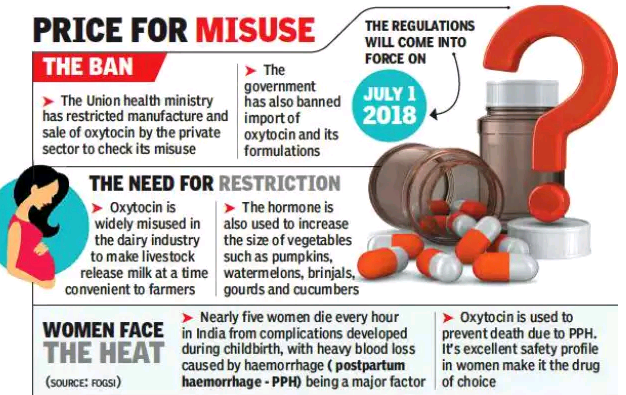SC on Banning manufacture of life-saving drug Oxytocin 26/08/2019 – Posted in: Daily News – Tags: National Dairy Research Institute
OXYTOCIN DRUG
For: Preliminary & Mains
Topics covered:
- How Oxytocin is a life-saving drug?
- Why the government banned it?
- What’s the concern now?
News Flash
The apex court referred to a larger Bench the issue of banning the manufacture of life-saving drug Oxytocin by private companies.
- The drug is used to induce labour and reduce bleeding after delivery. Excess bleeding is a leading cause of maternal deaths.
- The drug is used as the first-line drug for the prevention and treatment of post-partum haemorrhage at the time of childbirth.
- It is universally used in all delivering mothers immediately after delivery to help tighten the womb, separate the placenta and blood loss.
- Shortage of the drug will definitely affect the maternity care, leading to increase in maternal mortality.
Why is retail sale of oxytocin banned?
- The reason for the ban is the misuse of oxytocin in dairy animals, like buffaloes, to increase milk production.
- It is also said that the daily oxytocin injections made cattle barren and reduced their lifespans.
- In addition, it claimed that drinking milk from oxytocin-treated cattle led to male impotence, early puberty among women and cancers.
Does it make cattle barren?
- There is little evidence that oxytocin, when used judiciously under the oversight of a veterinary doctor, harms animals.
- In an unpublished study by the National Dairy Research Institute (NDRI), Haryana, buffaloes were given 2.5 and 5 IUs of oxytocin daily for 90 days. Here, too, there were no adverse effects on the buffalos’ estrous cycle and the ability to conceive was recorded.
- However, the animals grew addicted to oxytocin and produced lesser milk when deprived of it. This is why continuous use of the hormone is problematic.
Does milk from such cattle hurt humans?
- There is little evidence that oxytocin injected into cows at low doses is secreted in milk.
- In research, it is found that oxytocin levels were similar in milk from cows injected with up to 1 IU of the hormone and untreated cows.
- So, it is unlikely that humans would experience effects like cancer.
If oxytocin doesn’t hurt, why the ban?
- Oxytocin can be overused in the absence of oversight by a veterinary doctor. At high doses, it can hurt animals. Also, when untrained dairy farmers are administering the injection, it can cause pain for the animals.
- Sometimes oxytocin is used to compensate for stressful living conditions, which interferes with milk let-down. Also, because the synthetic oxytocin available in pharmacies is expensive, farmers buy crude pituitary extract of the hormone from grey markets.
- Such extracts contain several other hormones like gonadotropins, which could have ill-effects too.
Was the ban the only solution?
No, given the drug’s importance to both human and veterinary medicine, the Drugs Technical Advisory Board recommended against a ban, advocating better surveillance instead. A ban might lead to scarcity and high drug prices.
What’s the concern now?
Karnataka Antibiotics & Pharmaceuticals Ltd has said bulk production of the drug would take three-four years. This would put lives of many pregnant women at risk as it would lead to acute shortages.
Source: The Hindu
ALSO, READ MORE DAILY NEWS
- Op-Blue Freedom
- NASA’s Europa Clipper mission to Jupiter’s icy moon
- Planet LHS 3844b
- Labour code on mandatory minimum wages
- Innovators Growth Platform
- New stegosaurus species discovered
You are on the Best Online IAS preparation platform. You are learning under experts.
We are present on Facebook- Diligent IAS, LinkedIn- Diligent IAS, YouTube- Diligent IAS, Instagram- Diligent IAS. Get in touch with us.

